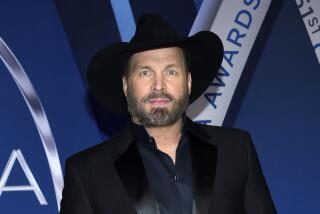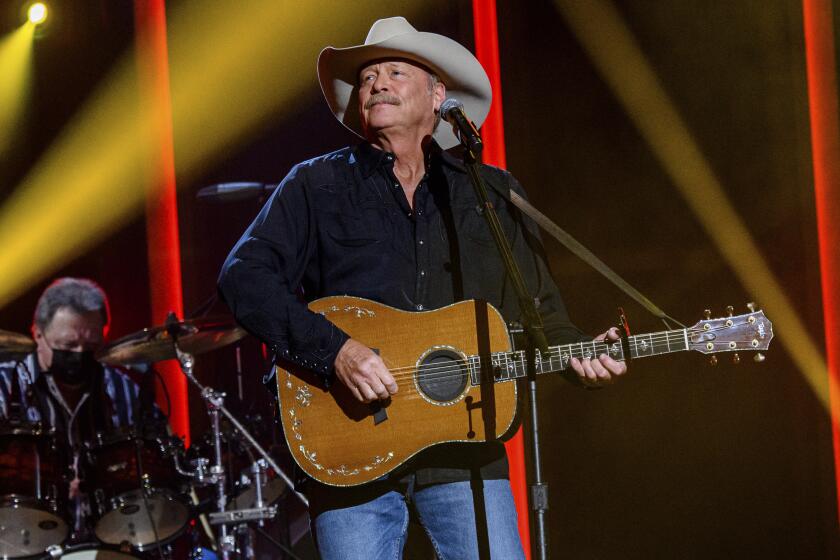Brooks still has the world on his strings
- Share via
NASHVILLE — Garth BROOKS has just concluded his triumphant run of nine consecutive sold-out shows at the Sprint Center in Kansas City, Mo. His latest single recently became the first record ever to debut at No. 1 on the country charts. Sales of his new three-disc set, “The Ultimate Hits,” put him back near the top of the national sales chart the week after the Recording Industry Assn. of America restored his status as the bestselling solo artist in U.S. history, having surpassed Elvis Presley to reclaim that title and remaining second overall only to the Beatles.
The word from Brooks’ camp is that he’s still retired from the music business, but after he said in Kansas City that was considering multi-show extravaganzas in other cities, he appears intent, as the title of his new single suggests, on being “More Than a Memory.” His recent flurry of activity looks like nothing so much as the first phase of a well-oiled campaign to relaunch one of the most marketable brands in pop music.
That, however, wasn’t the impression that Kevin King, program director at WSM-FM in Nashville, came away with after attending Garth Radio Seminar, a recent gathering in the country-music capital, where Brooks spoke to programmers from across the country about his conspicuous return to the spotlight after announcing his retirement seven years ago to spend more time with his three daughters, then ages 3, 5 and 7.
“He told us he had an obligation to do one more record for Wal-Mart and just decided to do a few shows to support it,” King said. “His commitment to being a dad seemed as strong as ever. That said, once his kids are out of school, I think he’ll give it another try.”
As long-standing music-industry conventions fall by the wayside in a rapidly shifting world, Brooks has options today that didn’t exist at the dawn of the millennium.
“The thing about technology is that it always takes yesterday’s decision and changes today’s result, because now you’re able to do things with technology you couldn’t when those decisions were made,” said Lon Helton, publisher of Country Air Check, a Nashville-based music industry trade publication. “Who knows how this series of nine dates in Kansas City will affect him? It might make him look for new ways to stay faithful to the intent if not the letter of his promise. If the letter of the law is that he’s not going tour again until his girls are out of school, technology might let him get around that exact statement while still letting him be at home 99.9% of the time.”
Indeed, the final concert of Brooks’ series of nine shows in Kansas City was simulcast Wednesday to more than 300 theaters nationwide -- almost 20 of them in the Southland -- and Brooks noted how much he liked the prospect of virtual touring.
Peter Strickland, senior vice president of sales and marketing for Warner Brothers Nashville, doesn’t think that artists of Brooks’ caliber ever completely withdraw from the pop mainstream, not as long as their music remains commercially viable.
“There’s always an opportunity to engage the marketplace without making it a full-time job, especially for people who have reached a certain stage in their career,” Strickland said. “We’ve seen many artists do that, from Fleetwood Mac to Rush. It’s only when you actually say you’ve retired that it becomes a marketing angle.”
Marketing ploy or not, Mike McGee, executive vice president of North American operations for Ticketmaster, believes it would be great both for Brooks’ fans and for the beleaguered music industry if his official return to performing came sooner rather than later.
“Garth Brooks has intangibles that most acts don’t,” McGee explained. “Garth has a unique ability to relate to his fan base. He’s genuine and you can’t fake that. He’s also never lost sight of the fact that the fans are the people who put him where he is. I was in Kansas City on opening night, and it was unbelievable. It was like a Mitch Miller singalong. Everybody knew every word of his songs. He sold out nine shows in less than two hours. Few acts of any stature or ability have that kind of drawing power.”
Brooks’ exclusive place in the pop pantheon has given him more than just the ability to pack arenas and sell monumental quantities of his albums (the RIAA last week certified him at 123 million and counting); it’s enabled him to play by different rules than most of his counterparts. Always an astute marketer of his music and image, he has shown a continued ability to do things his way that is all the more remarkable given how much the industry has changed, particularly in terms of digital media and downloading, since he withdrew from it seven years ago.
“He’s still holding the line on the way he does business,” said WSM’s King. “He will not allow his songs to be cherry-picked and downloaded. If you want to get his music you have to buy the whole album, not just your favorite tracks. Not many people could pull that off.”
Brooks also has priced “Ultimate Hits,” a 33-track set consisting of two CDs and a DVD, well below what comparable packages retail for -- under $13 at Wal-Mart.
“The industry has changed, but it hasn’t changed for him,” King said of Brooks’ lowball pricing scheme. “He’s still playing his own game.”
Some of this, however, has come at considerable cost to the singer’s collaborators and peers. Songwriters, already at the bottom of the music-industry food chain, took maybe the biggest hit when Brooks asked them to settle for reduced royalty rates on the previously released recordings included on the album. Listing his CD at an ultra-low price just to drive sales could also be viewed as devaluing recorded music in general, or at least creating the impression that his counterparts might be overcharging consumers for their product.
Ticketmaster’s McGee sees Brooks’ commitment to affordable record and ticket prices as an expression of loyalty to his fans. “In these days of $100 to $200 ticket prices, he’s keeping his prices down in the $25 to $30 range,” he said, referring to the face value of tickets for Brooks’ shows in Kansas City.
“Garth thinks that where he has his tickets priced is fair to his fans,” he added. “Before they went on sale we had a bridge call, and he got on the phone and said, ‘Where are we, boys? What do you think?’
“He’s hands-on, but not meddlesome hands-on,” McGee said. “He’s knowledgeable hands-on, and he can articulate that knowledge without being condescending. He’s a genuine guy, and the marketing of that sincerity will transcend a lot of things that have changed in the marketplace.”
Thom Schuyler, a senior executive at RCA’s country division from 1992 to 1998, had this to say when he addressed a gathering of the group Leadership Music in Nashville recently: “There is much spoken and written about Garth Brooks’ remarkable achievements, but our opinions of him, positive or otherwise, are irrelevant. The people have voted. He has reached them. He did it with shrewd, global marketing [and] with an astonishingly exciting live show.
“When it is all counted up, factored out, studied and analyzed, may it be remembered,” Schuyler added, quoting from Brooks’ breakthrough hit “The Dance,” “that he also [sang] this: ‘And now I’m glad I didn’t know / The way it all would end / The way it all would go / Our lives are better left to chance / I could’ve missed the pain / But I’d have had to miss the dance.’ ”
More to Read
The biggest entertainment stories
Get our big stories about Hollywood, film, television, music, arts, culture and more right in your inbox as soon as they publish.
You may occasionally receive promotional content from the Los Angeles Times.









